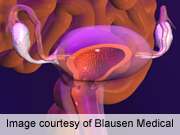(HealthDay)—Women in the postpartum period should receive counseling and access to contraceptive methods to promote optimal birth spacing, according to research published in the April issue of the American Journal of Obstetrics & Gynecology.
Heike Thiel de Bocanegra, Ph.D., M.P.H., of the University of California San Francisco School of Medicine in Sacramento, and colleagues analyzed data for a cohort of 117,644 low-income women from the 2008 California Birth Statistical Master file to assess the effect of access to contraception within 18 months after the index birth on interpregnancy interval.
The researchers found that, during the postpartum period, most women received user-dependent hormonal contraceptives as their most effective contraceptive method (55 percent), and 33 percent of women had no contraceptive claim. Compared with women who used barrier contraceptive methods only, the odds of achieving an optimal birth interval were 3.89 for women who used long-acting reversible contraceptive methods, 1.89 for those who used user-dependent hormonal methods, and 0.66 for those who used no method. For women who had user-dependent contraceptive methods, the odds of having an optimal birth interval increased by 8 percent for each additional month of contraceptive coverage.
"To achieve optimal birth spacing and ultimately to improve birth outcomes, attention should be given to contraceptive counseling and access to contraceptive methods in the postpartum period," the authors write.
More information:
Abstract
Full Text (subscription or payment may be required)
Journal information: American Journal of Obstetrics and Gynecology
Copyright © 2014 HealthDay. All rights reserved.




















